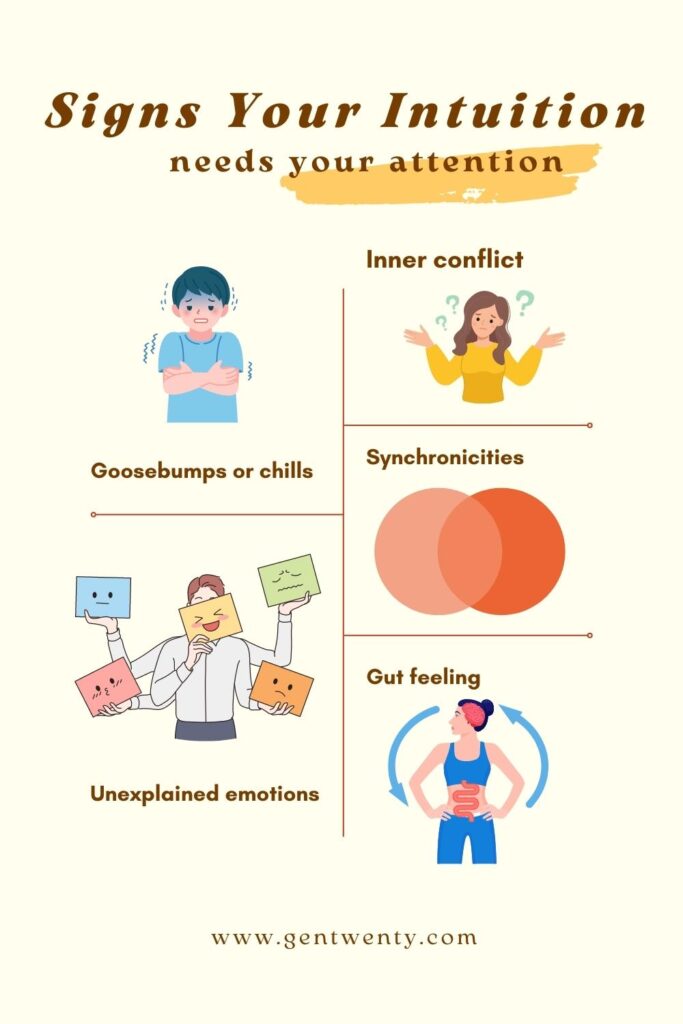Think of a time when you had to make a decision. Remember how you had an inner voice, at the back of your head, telling you which direction to go? Let’s talk about the word intuition.
That little voice is often perceived as our intuition, which guides us in our decision-making process.
It’s sometimes called a sixth sense, or a gut instinct. It’s a powerful tool that can help you make an important decision because it’s more than common sense—it’s your inner wisdom.
According to a review done by Erik Dane and M. Pratt, there are two types of decision making processes: insightful (gut instinct) and rational (logic and reasoning).
What’s more, researchers at Stanford University found that those who listen to their intuition made better decisions than those who relied solely on head-focused strategies.
What does this mean for me?
It can sometimes be hard to listen to our intuition, as we often feel that making a decision based on a gut instinct may not always be accurate or the best decisions. Moreover, there may have been times when we thought that our intuition was correct. However, we later realized that we shouldn’t have listened to it.
Plus, we may be thinking of more than one decision at the same time. If we’re going through a lot of personal and professional challenges, thinking of which step to take may become more difficult. This makes it harder to focus on which voice we should listen to, and which step to take.
But trusting our gut feeling can be life changing at times. Intuitive people can prevent further challenges before they occur.
And in order to do so, we can first unpack the reason why we may react to certain situations with a voice or gut feeling.
Where does intuition come from?
According to psychologists, intuition is the result of the powers of pattern-matching in the subconscious mind. These thoughts and feelings are usually based on past experiences and memories from similar situations.
Think of the process like our daily usage of social media. Your brain, which is the search engine, gathers information about the past event. Then based on the past event, your subconscious mind makes a prediction – similar to how Instagram suggests accounts based on your past searches.
But intuition isn’t something we just remember from our past experience. Rather, it’s the causations and origins of those memories which deeply affect our senses of ‘what’s right’ and ‘what’s wrong.’ It’s the outcome of earlier intellectual experience.

What are some signs of intuition?
Other than a voice inside of our heads, or a gut feeling, intuition can manifest itself in many ways.
Think of a time when you went into a shift at work. Your stomach may have been hurting beforehand, and you have felt like calling in. However, you wanted a better paycheck, so you decided to come in.
But midway throughout your shift, you begin to regret it. Many problems, which could’ve been prevented, occurred.
In this case, you have experienced one of the physical signs of intuition, which is stomach pain. Other physical signs include tension or tightness, goosebumps, sweaty palms, and nausea.
Recognizing when your intuition is speaking to you can be challenging because it often communicates through subtle signals.
Here are some signs that your intuition might be trying to get your attention:
- Gut Feeling: You experience a strong sense or feeling in your gut or solar plexus area. This is often referred to as a “gut feeling” or “gut instinct.”
- Inner Knowing: You suddenly and inexplicably “know” something without any logical explanation or evidence to support it.
- Goosebumps or Chills: You may experience physical sensations like goosebumps or chills when considering a certain decision or situation.
- Unexplained Emotions: You feel an intense emotion (e.g., excitement, fear, or unease) about a particular situation or person without a clear reason.
- Synchronicities: You encounter meaningful coincidences or signs that seem to align with your thoughts or concerns.
- Clear and Sudden Thoughts: You have clear and concise thoughts that seem to pop into your mind seemingly out of nowhere.
- Dreams and Intuitive Insights: Your dreams may contain valuable insights or guidance that align with your waking life.
- Physical Sensations: You experience physical sensations, such as a tingling sensation, pressure, or warmth in certain areas of your body when contemplating something important.
- A Feeling of Certainty: You feel a strong sense of certainty or conviction about a decision or course of action.
- Subconscious Nudges: You find yourself drawn towards or away from certain people, places, or situations, without a clear reason.
- Intuitive Warnings: You get a feeling of warning or caution about a situation or person, even if everything appears fine on the surface.
- Inner Conflict: You experience a conflict between your logical mind and your intuitive sense, with your gut feeling urging you in a different direction than your rational thoughts.
- Feeling Calm and Confident: When following your intuition, you feel a sense of calmness and confidence in your decisions.
It’s important to note that intuition can vary from person to person and may manifest differently in different situations.
The key to recognizing your intuition is to pay attention to your inner self, become more aware of these signals, and learn to distinguish them from fear or wishful thinking.
Over time, as you develop a stronger connection with your intuition, it will become easier to recognize its guidance and incorporate it into your decision-making process.

What affects our trust in our intuition?
Trusting in our intuition can be learned and practiced. However, there are external factors which can affect our ability to trust in our gut feelings.
For example, trauma can affect our subconscious thoughts, which makes it less likely for us to rely on intuition. After experiencing a traumatic event, or trauma for a long time, many of us may find it hard to trust ourselves since we’re living in a state of hypervigilance.
When we’re hypervigilant, our minds are preoccupied with thoughts or memories of negative experience. This makes it harder for us to stay grounded in our current behavior.
Overthinking can also affect our trust in our intuition. You may begin to question yourself about your previous decisions, but by overthinking, you’re more focused on the mistakes. However, intuition is more so about relying on your own feelings.
Let your intuition become a “second brain” of sorts and you will learn to think a different way. Take a deep breath, and then let’s dive in.
Why Is It Important To Listen To Your Intuition?
Listening to your own intuition will not only help you avoid dangers or obstacles, but it will also enhance your skills in different ways.
For example, intuition was always an important element in the creative process. Since intuition mainly relies on a person’s previous experience, being intuitive allows us to have more of a holistic approach towards our ideas.
Research also shows that an intuitive mind leads to improved mental and physical health. Intuition also allows us to feel more confident and comfortable with making our own decisions for ourselves. These feelings tend to calm our minds and reduce stress.
Moreover, whenever we face a physical health problem, being intuitive helps us realize some of our body’s messages. For example, when we feel tired and continue to push ourselves, we may wonder if it may still be the right decision to continue without rest or not.
Learning to trust and listen to your intuitive voice is a good idea so you can tap into your unconscious mind, practice conscious reasoning, and learn the best way to make decisions.

How to Listen To Your Intuition and Trust Your Gut Instinct
There are many steps in terms of identifying your gut feelings and messages. Here are some of the ways in which you can start listening to your intuition:
1. Identify your feelings:
When you react to something strongly, deconstruct your feelings and emotions.
Ask yourself: Why do you feel this way? Can this be based on previous experience? What do you think the voice inside of your head is trying to tell you?
If you notice that your body is responding physically, on top of other emotional responses, take a note of this.
Our body language can tell us a lot, especially when we’re having to make difficult decisions, have hard conversations, or meeting new people.
2. Learn to get out of your head:
If you’re someone who tends to overthink a lot, you may notice that overthinking makes it more difficult to identify and trust your intuition.
Having too much on your mind can cloud your intuition, which makes it difficult to trust your emotions. Overthinking can be your mind’s way to keep you safe, but it’s not awlays helpful.
So, in order to begin listening to your intuition, learn how to declutter the thoughts in your head as well. You can do this by practicing mindfulness, journaling, and meditating.
If you’re overwhelmed by figuring out the right thing to do for your first step, try taking a long walk, as emotions need motion.

3. Learn to observe:
Keep in mind that our intuition relies on our subconscious minds noticing how past events can affect future challenges. In order for our brain to process this quicker, it is important for us to learn how to observe.
When we observe what happened in the past, our subconscious brain may notice that similar trends are occurring in future events. Then, we may receive physical or mental signals which foreshadow the outcome of the situation.
Observation will allow us to recognize patterns, and gain insight on how these patterns have and continue to affect us.
4. Let go of peer pressure:
Peer pressure heavily affects our own ability to make our own intuitive decisions. When someone is telling you to behave or act a certain way, it can be difficult to stand up for yourself.
But in order to listen to our intuition, we have to look out for what’s best for us, instead of others. We need to ask ourselves about our own needs and wants. This is a very important part—we’ll better understand ourselves and our own values.
5. Get to understand what makes you comfortable:
Due to the environment we were raised in, we may feel more comfortable in certain environments than others.
Everytime we walk into a new environment, we should identify how comfortable we feel. Even if other people may feel comfortable and behave kindly to us, we may feel that something is still off.
So, when you feel uncomfortable in an environment, be sure to recognize why you’re feeling this way, and see how similar environments have affected your past. Yes the first time or first few times will be uncomfortable, but learning to recognize is a deeper part of growth.
6. Learn to set your own boundaries:
Boundaries are not only important for our mental and physical well-being, but they’re important in terms of allowing us to understand why we react to situations in a certain manner.
By setting boundaries with others, you’re protecting your own energy from other people’s tasks or situations. Although it can be difficult to tell others what you’re comfortable with, you’ll feel more confident in the process.
7. Ask yourself if you’re relying on intuition or judgment:
Feelings are tricky. Sometimes, it’s easy to get caught up in the mix. Practice conscious awareness.
Although you may be listening to the voice inside of your head, be careful when you’re comparing a person or an event.
When you compare something based on the past, you may be judging the situation instead of following your intuition.
So, when you react to something strongly, ask yourself if it was based on your gut feeling, or rather on comparisons from the past.
8. Notice how you’re reacting once you made the decision:
We often use intuition to make our own decisions. However, what if we made the worst decision out of all possibilities? Although mistakes do happen, you can learn how to identify them by your reaction.
For example, are you regretting the decision after it’s made? Are other opportunities now knocking on your door? And do you sense a mismatch; is the result of the decision something you didn’t expect?
Once you answer these questions, you can prevent yourself from experiencing further challenges by problem-solving.
9. Notice how your own character changed after you made the decision:
Intuition heavily relies on self-awareness and compassion. Regardless of the decision you’ve made, notice how you have changed personally.
If you notice that you’re being involved in more situations and are facing more challenges, your intuition is trying to tell you to be more aware next time. These personality challenges are usually the result of lowering your self-awareness.
So next time when you make a decision, observe carefully how your body responds.

10. Be mindful of the people you surround yourself with:
Surround yourself with supportive and caring people who are understanding and compassionate with your values. The energy they carry will then project onto you, and allow you to be more aware of your surroundings.
When you surround yourself with toxic people, you may notice that your mind is on alert mode more often. However, by being constantly on alert mode, you’re surrounded by negative energy which makes it more difficult to trust in yourself.
Remember that intuition always starts with trusting yourself. And in order to trust yourself, you’ll need a good supportive system in order to see what trust really means.
Your best friends, your family, anyone who you invite to stay in your life should be there to lift you up.
11. Clear your mind:
Clearing your mind and getting in touch with your intuition can be beneficial for decision-making and problem-solving. Here are some effective ways to achieve a clear mind and listen to your intuition:
- Meditation: Regular meditation helps quiet the mind, reduce stress, and enhances your ability to be in tune with your inner thoughts and feelings. Find a quiet space, sit comfortably, and focus on your breath or a specific point of concentration.
- Deep Breathing: Taking deep, slow breaths can help calm your nervous system and bring your attention to the present moment. This can help clear mental clutter and make room for your intuition to surface.
- Nature Walks: Spending time in nature can be incredibly grounding and allows you to disconnect from distractions and technology. Walk or sit in a park, garden, or any natural setting to let your mind wander and connect with your intuition.
- Journaling: Write down your thoughts, feelings, and any concerns you may have. Journaling can be therapeutic and helps organize your thoughts, making it easier to identify your intuition when it speaks to you.
- Mindfulness Practices: Engage in mindfulness exercises, such as body scanning or mindful eating, to become more aware of your body and thoughts in the present moment. This can help clear mental chatter and foster intuitive insights.
- Creative Expression: Engaging in creative activities like drawing, painting, writing, or playing music can help access your intuition. It allows you to express yourself freely and tap into your subconscious mind.
- Limit Distractions: Reduce distractions from screens, social media, and constant notifications. Disconnecting from technology for some time allows your mind to settle and tune into your intuition.
- Yoga or Stretching: Practicing yoga or gentle stretching can release physical tension and create mental clarity. It can also improve your body-mind connection.
- Visualization: Close your eyes and imagine a peaceful scene or a positive outcome for a situation you’re pondering. Visualization can help you access intuitive insights.
- Trust Yourself: Have faith in your abilities and trust your gut feelings. Sometimes, overthinking can block your intuition, so practice listening to your inner voice without self-doubt.
- Sleep and Rest: Ensure you get enough rest and sleep. Fatigue and sleep deprivation can cloud your mind and hinder your ability to connect with your intuition.

Remember, developing a deeper connection with your intuition takes time and practice. Be patient with yourself and make these activities a regular part of your routine.
With consistency, you’ll likely notice improvements in your ability to clear your mind and listen to your intuition more effectively.
Final Thoughts on Listening To Your Intuition
Listening to your intuition is a challenging task, as you’ll have to recognize certain behaviors, energies, and thoughts. You’ll also have to ask yourself questions, and observe how previous environments would have impacted your levels of intuition.
However, you can learn how to listen to your intuition. And in order to begin the process, you have to let go of things which are bothering you.
Notice what you’re spending most of your time worrying about, and learn to let it go. This will allow you to identify your feelings from a clear state of mind.
In the end, intuition is important in terms of allowing us to make better decisions for ourselves and identifying our emotions. So, by learning how to listen to our intuition, we may be able to foresee a change in our current situation.
